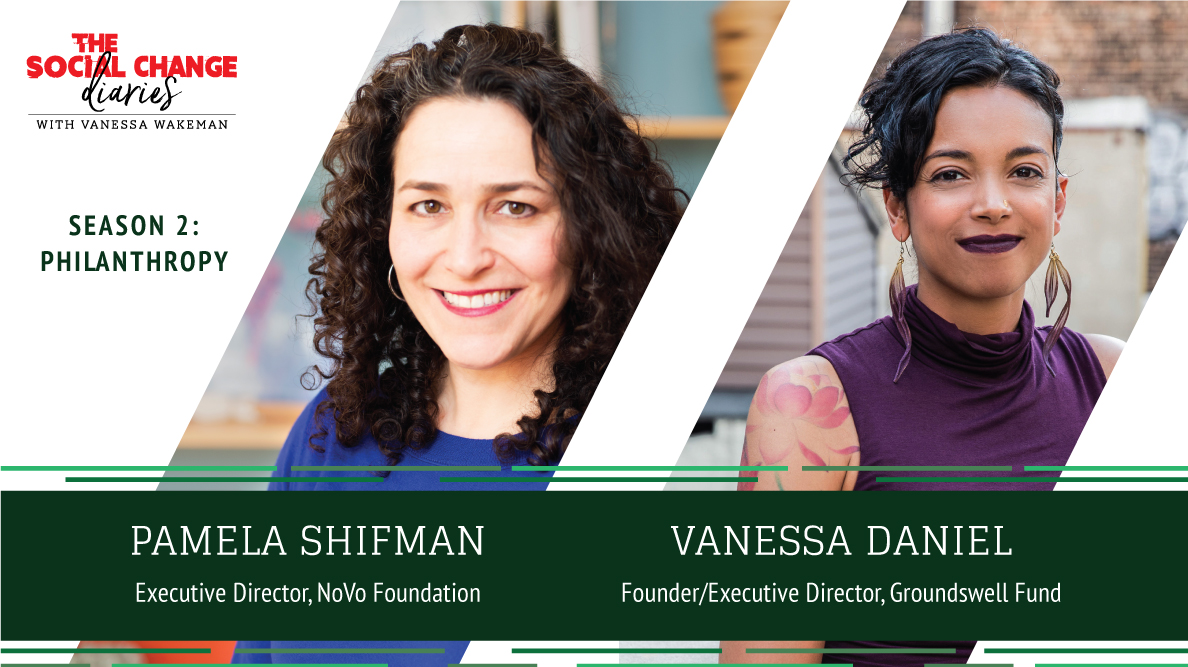
About This Episode
Institutional philanthropy plays a pivotal role in advancing social change, but far too often these same organizations hinder progress through systematic white supremacy. Vanessa Daniel and Pamela Shifman highlight the challenges and opportunities to bring about equity in the sector. The conversation highlights the huge disparity in funding and support for organizations led by people of color, who often receive less than their counterparts.
About
Pamela Shifman is a passionate and experienced advocate for girls and women’s rights, social justice, and transformative philanthropy. She brings this deep commitment to her role as Executive Director of the NoVo Foundation, a private grantmaking foundation based in New York City. Pamela joined the NoVo Foundation in 2008 as the Director of Initiatives for Girls and Women and took on the role of executive director in 2014. Pamela came to NoVo Foundation from UNICEF headquarters where she led the organization’s efforts to end gender-based violence in conflict-affected settings. Prior to joining the UN, Pamela worked to end violence and discrimination against girls and women in a variety of contexts, including as Co-Executive director of the international women’s rights organization Equality Now, and as Legal Advisor to the ANC Parliamentary Women’s Caucus in South Africa. A native of Michigan, Pamela holds a B.A. from the University of Michigan and a J.D. from the University of Michigan Law School.
Vanessa Daniel is the founder and Executive Director of Groundswell Fund, the largest funder of the U.S. reproductive justice movement and of Groundswell Action Fund, the largest fund in the country centering giving to women of color-led 501c4 organizations. Under her leadership, Groundswell has moved nearly $40 million to the field, with a focus on grassroots organizing led by women of color, low income women and transgender people, and ninety percent of its total giving going to work led by women of color. Vanessa’s roots in labor and community organizing inspired a unique funding model at Groundswell: a program staff team of women of color who come directly out of grassroots organizing and who support grantees through grantmaking, capacity building, and funder organizing to raise the visibility of grantee work in the broader funder/donor community. In 2017, Groundswell received the National Committee of Responsible Philanthropy’s “Impact Award” for smashing issue silos and Vanessa was featured in the Chronicle of Philanthropy as one of 15 “Influencers” who are changing the non-profit world. Vanessa currently serves on the Board of Directors of Common Counsel Foundation. She has a B.A. in American Ethnic Studies from Smith College and is a graduate of the Center for Third World Organizing’s Movement Activist Apprenticeship Program.
In Their Words…
“We know that 90% of foundation leaders are white. We need to change that. And in the meantime, we also need to recognize that with our numbers comes an undeniable responsibility. It will be our courage or our silence that will ultimately determine whether philanthropy works to dismantle white supremacy in all its forms, or not.” -Pamela Shifman
“We can see that women-of-color-led organizations are often under-invested in by philanthropy, and they somehow manage to do incredible transformational work on a shoestring. And, as a result, philanthropy notices that and says, ‘They managed to do transformational work on a shoestring. We can give them a really small grant and they will really take that grant and run with it,’ instead of recognizing that they shouldn’t have to do their work on a shoestring. Actually, women-of-color-led organizations should be allowed to flourish and thrive and have the resources that they need to be able to make the incredibly important change that they are making. So, too often what we see is that small grassroots organizations get punished for being small grassroots community-led organization by getting smaller grants than large, often white-led organizations, which are given larger grants”. – Pamela Shifman
“As a white leader in philanthropy, I feel particularly responsible to and accountable to addressing white supremacy in our sector and to engaging in conversations with my white colleagues about what more we all can do to address racism in our sector. I think, because of my whiteness, I have access to white spaces. People listen to you. I think the way racism works is that white people listen to other white people, so I have an obligation as a white person to continuously raise questions of racism and to really challenge the comfort of our sector. -Pamela Shifman
“You know, we’re living in an era where we have enough resources on the planet for every single person to live well, but we have designed economic systems that concentrate massive amounts of wealth in the hands of the few and leave masses of people to suffer in widespread scarcity and poverty. Many of us saw the recent Oxfam study showing that the annual earnings of the world’s billionaires in 2017 alone could have ended global poverty seven times over. Many of these billionaires engage in conventional philanthropy, and they’re making donations and collecting tax write-offs, but there isn’t a real interest in ending world hunger by any significant redistribution of their wealth, or by changing the system that perpetuate it by moving profits increasingly out of workers’ pockets and into theirs. It’s more of a feel-good exercise and it set up to go on in perpetuity. Social-centric philanthropy, is a different kind of philanthropy— it’s set up to actually put itself out of business.” -Vanessa Daniel
“The longest distance in philanthropy is that which is traveled between the conversation, which can become very radicalized and progressive, and the movement of money. And so how do we actually get to that place where folks in philanthropy are confronting discomfort, in order to shift the status quo on the movement of money?” -Vanessa Daniel
“As a woman of color, my ultimate accountability is to the material conditions of the most marginalized people in my community, and that includes women of color, transgender people, or inequality of the community, and making sure that I maximize my proximity and relationship to the levers of power and money and philanthropy to unlock the maximum number of resources to transform and do good work in the community. I have a responsibility to value the lives of community members over the white comfort of my colleagues in philanthropy and to continue to raise the question. And that goes beyond the confines of what white men in philanthropy tell me I am allowed to imagine.” – Vanessa Daniel

